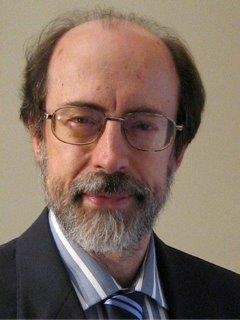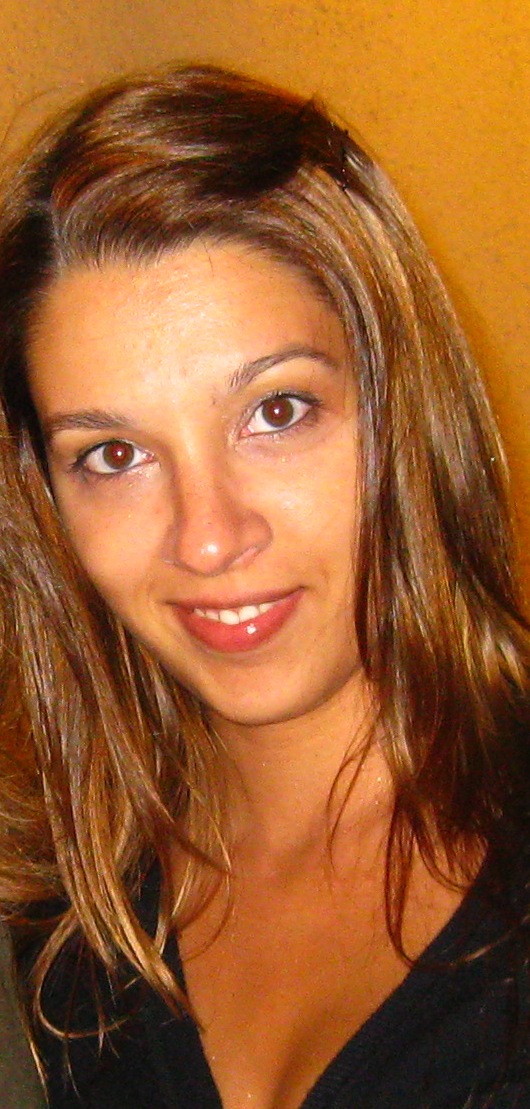|
|
|
|
|

Plenary and keynote lectures
Laurent Thouin
Département de Chimie - École Normal Supérieure, Paris
New Insights in Microelectrochemistry
| Laurent Thouin received in 1994 his PhD degree in Analytical Chemistry from Pierre et Marie Curie University (UPMC, Paris). After a postdoc conjointly led at IRMN (Belgium) and CEA (France) he became CNRS researcher and joined Amatore’s group in 1995 at École Normale Supérieure (ENS, Paris). He is currently director of research at CNRS and vice director of the chemistry department of ENS. Laurent Thouin has been actively working on fundamental properties of ultramicroelectrodes with particular emphasis on innovative concepts and applications related to specific mass transport regimes at the micrometric scale.
His recent interest is focused on the properties of microelectrodes implemented in microfluidic devices. He authored more than 60 peer-reviewed papers in major international journals.
He was the recipient of the Electrochemistry prize from the French Chemical Society in 2005.
| 
Craig BanksDivision of Chemistry and Environental Science - Manchester Metropolitan UniversityElectrochemistry of graphene and related 2D materials
| Craig E. Banks is a Professor at Manchester Metropolitan University and holds a personal chair in electrochemical and nanotechnology.
Craig has published over 300 papers (h-index 48) and has spun out three companies from his research.
Craig’s current research is directed towards the pursuit of studying the fundamental understanding and applications of nanoelectrochemical systems such as graphene, carbon nanotubes, and nanoparticle-derived sensors, developing novel electrochemical sensors via screen-printing and related techniques, and energy storage and generation based on graphene composites.
| Ricardo Souto
Department of Chemistry - University of La Laguna
Combined scanning electrochemical microscopy techniques and probes for greater chemical resolution of corrosion processes
| Associate Professor (Lecturer), Department of Applied Physics, ULL, 1988 Professor Titular (Reader), Department of Physical Chemistry, ULL, 1992 Visiting Scholar, Department of Materials Science, University of Cambridge (UK), 1993-2002. Catedrático (Professor), Department of Physical Chemistry, ULL, 2008. Visiting scientist: Instituto Superior Técnico, Lisboa University of Manchester Institute of Science and Technology Institute of Physical Chemistry, University of Freiburg (Germany). Laboratory for Electroanalysis and Sensors, University of the Ruhr at Bochum (Germany) Hungarian Academy of Sciences, Budapest (Hungary) Department of General and Physical Chemistry, University of Pécs (Hungary)
Scientific activity: 140 papers in scientific journals; Reviewer for 25 scientific journals in Electrochemistry, Corrosion Science, Physical Chemistry, Biomaterials, Surface Science and Environmental Electrochemistry.
Active international collaboration: Department of Chemical Engineering, Instituto Superior Técnico, Lisboa (Portugal). Department of Materials Science and Metallurgy, University of Cambridge (UK). Department or Environmental Sciences, University of Venice (Italy). Department of Physical Chemistry, University of Venice (Italy). Laboratoire de Interfaces et Systèmes Electrochimiques, Universitè Pierre et Marie Curie (París, France). Institute of Chemistry, Hungarian Academy of Sciences, Budapest (Hungary). Laboratory for Electroanalysis and Sensors, University of the Ruhr at Bochum (Germany). Faculty of Chemical Engineering and Environment, The ³Gheorghe Asaghi² Technical University of Iasi (Romania). Department of General and Physical Chemistry, University of Pécs (Hungary).
Award of the Spanish Chemical Society for Young Scientists in Electrochemistry (1990-1991). Best M.Sc. Dissertation (1983) and best Ph.D. Dissertation (1988) in Chemistry, University of La Laguna.
|
José Paulo Pinheiro
Laboratoire Interdisciplinaire des Environnements Continentaux - Université de Lorraine
AGNES and SSCP in solid electrodes
| José Paulo Pinheiro (ORCID number 0000-0001-7925-9733) is a chemist with a degree in Chemical Engineering from “Instituto Superior Técnico”, Lisbon, Portugal in 1990. He then continued his PhD in the same institute, under supervision of Profs. Ana Maria Mota and Maria de Lurdes Gonçalves, successfully defended in 1996. In 2011 he obtained the “Agregação” title in the Chemical Engineering Department of “Instituto Superior Técnico”, Lisbon, Portugal. He joined University of Algarve in1995, and become Associate professor in Faculty of Sciences and Technology from January 2003 till September 2014. In October 2014 he joined LIEC and becomeFull Professor in the “École Nacionale Supérieure de Geologie” of Université de Lorraine (France). JP Pinheiro has being focused in dynamic trace metal speciation and bioavailability, interaction of metal ions with natural organic matter. In recent years he has been involved in the joint development and validation of dynamic trace metal speciation analytical methods and the models necessary to interpret their signals. He has over 65 papers published in peer-refereed international journals. Since June 2012 belongs to the editorial board members of the journal Environmental Science and Pollution Research. He was awarded a “Pesquisador Visitante Especial” grant from CNPq (Brasil) between August 2013 July 2016. He is also co-organizer of the biennial graduate Course “Speciation and Bioavailability”, usually being held at Wageningen University, The Netherlands.
| 
Lifeng Liu
International Iberian Nanotechnology laboratory - INL
Electrochemical and photoelectrochemical hydrogen production based on nanostructures consisting of earth-abundant elements
| Lifeng Liu received both his MS (2004) and PhD (2007) degrees in Condensed Matter Physics from theInstitute of Physics, Chinese Academy of Sciences (IOP-CAS). He joined Max Planck Institute of Microstructure Physics – Halle (MPI-Halle), Germany in 2007, first working as a postdoctoral researcher and then as a member of scientific staff. He started his independent research career in 2008 and became the head of group “Porous Alumina” in 2009. In 2011, he moved to the InternationalIberianNanotechnology Laboratory (INL) and established a research group there. Lifeng has been actively working on nanostructures and materials electrochemistry since2002, with particular emphases on fabrication and characterization of complex nanostructures, nanoscale solid-state reactions, ferroelectric nanostructures, and nano-electrocatalysts. His recent interest is mainly focused on nanomaterials for renewable energy generation, storage, and conversion. So far, he has authored/co-authored more than 90 peer-reviewed papers in major international journals, which have been collectively cited more than 2700 times, leading to an h-index of 31 (Researcher ID: A-2522-2012, Orcid ID:0000-0003-2732-7399). He has actively served as an invited reviewer for more than 50 scientific journals and a grant reviewer for several funding agencies. Additionally, he was a member of organizing/scientific committee of a few national/international conferences. He is currently the associate Editor of “ScienceJet”. He is the recipient of 2014 FCT Investigator Grant.
| 
Armando J.L. Pombeiro Centro de Química Estrutural, Instituto Superior Técnico, Universidade de Lisboa Playing with Electrons: the Magic of Molecular Electrochemistry
| Award Lecture
Armando J. L. Pombeiro is Full Professor at the Instituto Superior Técnico, Full Member of the Academy of Sciences of Lisbon (enrolled in various directive and representative positions), President of the Centro de Química Estrutural research Centre, former President and co-founder of the Portuguese Electrochemical Society, and Director of the PhD program on Catalysis and Sustainability (CATSUS). He teaches the Homogeneous Catalysis course at the Multinational Master in Molecular Chemistry at the École Polytechnique, Paris, and is Invited Chair Professor at the National Taiwan University of Science and Technology. His research Group investigates the activation of small molecules with industrial, environmental or biological significance, including metal-mediated synthesis and catalysis (e.g., functionalization of alkanes under mild conditions), crystal engineering of coordination compounds, design and self-assembly of polynuclear and supramolecular structures, molecular electrochemistry of coordination compounds (redox potential-structure relationships, reactions induced by electron-transfer and its mechanisms) and theoretical studies. He was chairman or member of organizing/scientific committees of 40 international conferences or schools (e.g., the XXV International Conference on Organometallic Chemistry, ICOMC). He authored or edited 4 books, (co-) authored over 600 research publications, 37 patents, and presented ca. 100 invited lectures at international conferences. His work has received over 12,000 citations, h-index = 52 (Web of Science). Among this honors, he has been awarded the Portuguese Electrochemical Society Prize, the Madinabeitia-Lourenço Prize from the Spanish Royal Chemical Society, and the Ferreira da Silva Prize from the Portuguese Chemical Society. | 
Diana Fernandes
Departamento de Química e Bioquímica, Faculdade de Ciências - Universidade do Porto
Hybrid POM-Nanomaterials & nanostrutured films
| Young Scientist
Diana Fernandes received her degree in Chemistry (2005) from the University of Évora (UE) and her PhD in Chemistry (2010) from the University of Aveiro (UA). In 2011, she joined the Chemistry and Biochemistry Department of the University of Porto as a postdoctoral fellow and is member of REQUIMTE, a network in Chemistry and Chemical Engineering in Portugal. Her research interests have been focused on the chemistry of materials and nanomaterials - polyoxometalates and carbon materials (carbon nanotubes, graphene derivatives), functionalization of materials and nanomaterials, functional nanostructured hybrid films and electrode modification: applications from electroanalysis to electrocatalysis. Recently, her interest is mainly focused on nanomaterials for renewable energy generation, storage, and conversion. So far, she has authored/co-authored more than 20 peer-reviewed papers in SCI journals (h-index = 6) and 23 communications in national and international congresses (http://www.researcherid.com/rid/D-6280-2013, http://orcid.org/0000-0001-5263-2737). She has supervised several undergraduate/graduate students and participated in 4 R&D and R&TD projects. Additionally, she has actively served as an invited reviewer for several scientific journals and was a member of organizing/scientific committee of some national conferences, workshops and courses.
|
|
|